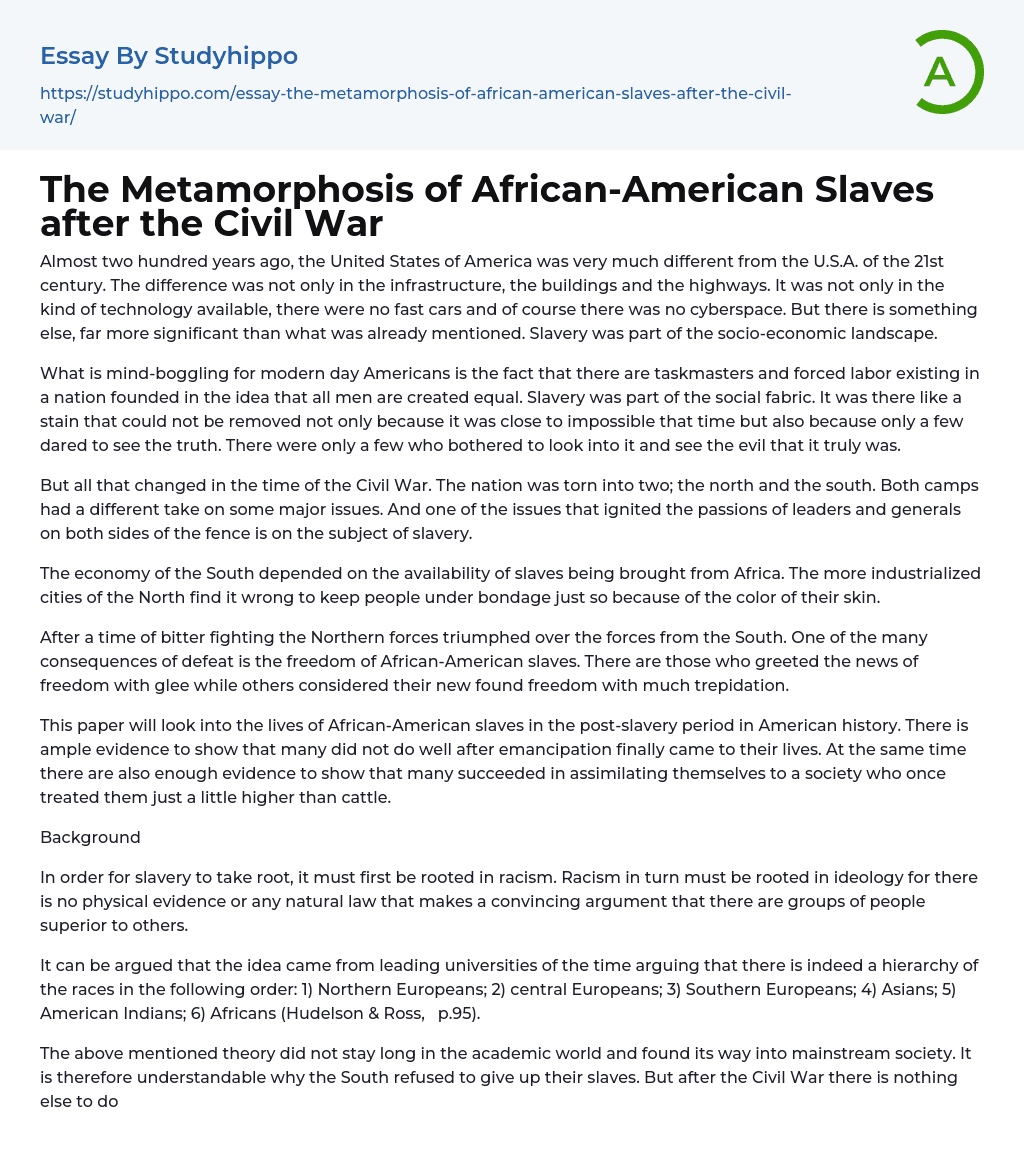

The Metamorphosis of African-American Slaves after the Civil War Essay Example
During the 19th century, the United States of America had distinct characteristics compared to its present state. Infrastructure, buildings, and highways varied significantly. Technological advancements such as fast cars and the concept of cyberspace were absent. However, a notable feature that set this period apart was the prevalent presence of slavery in society and economy.
The existence of taskmasters and forced labor in a country founded on equality is surprising to present-day Americans. Slavery was deeply ingrained in society, like an indelible mark that could not be eradicated. Its persistence stemmed from the difficulties faced in eliminating it back then, with only a brave few who acknowledged and confronted its inherently wicked nature.
During the time of the Civil War, the nation became divided into two factions: the north and the south. Each faction held differing vi
...ews on various major issues, including the topic of slavery, which deeply stirred the emotions of both leaders and generals from both camps.
The South's economy depended on importing slaves from Africa, whereas the more industrialized cities in the North opposed enslaving individuals purely because of their skin color.
Following a period of intense conflict, the Northern army prevailed over the Southern forces, resulting in the emancipation of African-American slaves. While some people greeted this news with joy, others faced their newfound freedom with apprehension.
This article explores the post-slavery experiences of African-American slaves in American history. Many faced challenges after being freed, but there is also evidence showing that many successfully integrated into a society that had previously dehumanized them.
Background
Slavery requires racism a
its foundation, which in turn must be rooted in ideology. There is no physical evidence or natural law that provides a convincing argument for the superiority of one group of people over another.
The concept of a racial hierarchy, suggesting the superiority of specific races, has been put forth by well-known universities. This hierarchy places Northern Europeans at the top, followed by central Europeans, Southern Europeans, Asians, American Indians, and Africans (Hudelson ; Ross, p.95).
Following its rapid transition from academia to mainstream society, the theory clarified the reasons behind the South's resistance to emancipating their slaves. Nevertheless, in the aftermath of the Civil War, Southerners were compelled to relinquish their valuable assets.
Ron Eyerman (2001, p. 23) states that by the end of the civil war, approximately 3,953,696 slaves were freed. This accounted for roughly 12.6% of the entire American population and 32% of the Southern population in 1860. The significant number of liberated slaves undoubtedly had a considerable influence on the economic landscape.
Education
Former African-American slaves took a significant stride in education, as they endured centuries of living in appalling conditions. Not only were they deprived of basic necessities, but they were also prohibited from acquiring literacy skills.
An uneducated slave without intellectual abilities but skilled in physical labor, such as hauling cotton and corn, is deemed more valuable as a worker compared to an intellectual who can engage in intellectual discussions but lacks usefulness for physical tasks.
African-Americans find motivation from influential figures such as Booker T. Washington, Frederick Douglas, and Harriet Jacobs in their pursuit of personal growth through education. One individual who holds
great importance is Booker T. Washington, who overcame significant obstacles and developed impressive writing skills despite initially having a limited grasp of the English language.
In his book Up from Slavery, Washington remembered his bittersweet experience and his strong desire to read. As a young child, he made a resolution to attain enough education to read everyday books and newspapers. This determination paved the way for black children to be granted opportunities that were previously withheld from their ancestors.
Social Networking
The transformation of African-American slaves into free individuals did not solely rely on acquiring literacy skills. Their identity was also influenced by the social connections they developed while still enslaved. These familial and friendship networks persisted even after their emancipation from the plantations.
According to McMurry, the slave community on plantations and farms served as an extended family. After gaining freedom, these informal support networks transformed into structured church groups and benevolent organizations that provided assistance to families in times of crisis (as cited in Eyerman, 2001, p. 24).
The church plays a vital role in providing spiritual and physical healing, as well as assisting individuals in reconnecting with their African-American identity through Bible study. This knowledge was later utilized by influential figures like Martin Luther King, Jr. to advocate for freedom.
- Malcolm X essays
- Black Lives Matter essays
- Antisemitism essays
- Ku Klux Klan essays
- Miscegenation essays
- Racial Segregation essays
- I Have a Dream essays
- Martin Luther King essays
- Racial Inequality essays
- Black History Month essays
- Black People essays
- Slave Trade essays
- American Civil War essays
- Atomic Bomb essays
- Attack essays
- Cold War essays
- Crimean War essays
- Diplomacy essays
- Emilio Aguinaldo essays
- Emperor essays
- Hitler essays
- Iraq War essays
- Korean War essays
- Mexican American War essays
- Nazism essays
- Nuclear Weapon essays
- Philippine Revolution essays
- Revolutionary War essays
- Rwanda essays
- The Spanish American War essays
- Trench Warfare essays
- Tribe essays
- Vietnam War essays
- War of 1812 essays
- Western Front essays
- World War I essays
- World War Ii essays
- Abolitionism essays
- Adam Smith essays
- American History essays
- American Revolution essays
- Ancient Egypt essays
- Articles Of Confederation essays
- Atlantic Slave Trade essays
- Aztec essays
- Benjamin Franklin essays
- Civil Rights Act of 1964 essays
- Civil Rights Movement essays
- Civil war essays
- Cleopatra essays



